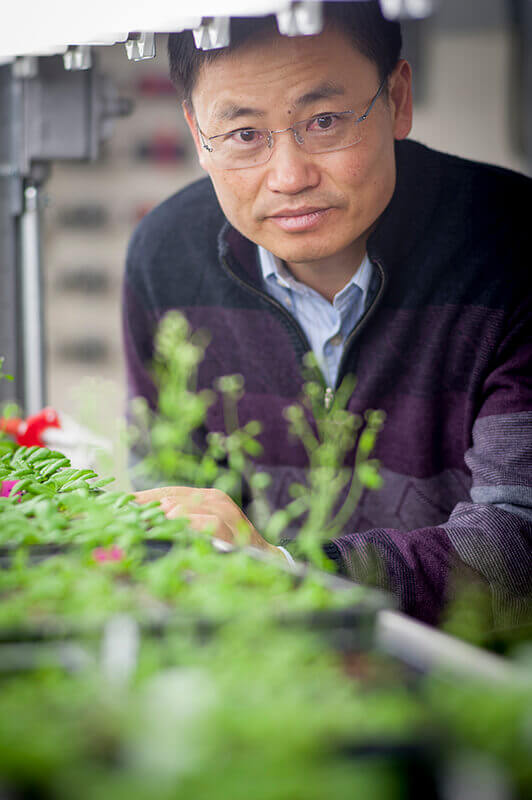January 16, 2018
Study: Hormone keys plant growth or stress tolerance, but not both
 Purdue University researcher Jian-Kang-Zhu has discovered a mechanism that controls a plant’s ability to grow strongly or tolerate stress. The findings could help develop plants that can do both (Purdue Agricultural Communication photo).
Download image
Purdue University researcher Jian-Kang-Zhu has discovered a mechanism that controls a plant’s ability to grow strongly or tolerate stress. The findings could help develop plants that can do both (Purdue Agricultural Communication photo).
Download image
WEST LAFAYETTE, Ind. – Plants that grow well tend to be sensitive to heat and drought, and plants that can handle those stresses often have stunted growth. A Purdue University plant scientist has found the switch that creates that antagonism, opening opportunities to develop plants that exhibit both characteristics.
“Normally these two are antagonistic, but in nature, some plants tolerate stress and grow well. The questions is why some plants can have both, but most plants cannot,” said Jian-Kang Zhu, distinguished professor of plant biology in the Department of Horticulture and Landscape Architecture. “Once you know how the stress response and growth pathways are connected, hopefully we will be able to decouple them.”
Working with model plant Arabidopsis, Zhu found that abscisic acid (ABA), a plant hormone, is activated in plants that can tolerate stresses such as salt and drought. But ABA sets off a chain reaction that stymies plant growth.
Zhu found that in stressed plants, the ABA pathway is activated and leads to phosphorylation of the Target of Rapamycin (TOR) kinase. This essentially turns off the TOR kinase, which is essential for plant growth.
The opposite happens in unstressed plants. TOR disrupts ABA perception, shutting down the plant’s stress responses. Those plants tend to exhibit strong growth.
“This is the key to the antagonism between stress and growth,” Zhu said.
The findings, published in the journal Molecular Cell, could help scientists and breeders who want to develop plants that can handle environmental stresses and still grow well.
The Chinese Academy of Sciences and the U.S. National Institutes of Health supported the research.
Writer: Brian Wallheimer, 765-532-0233, bwallhei@purdue.edu
Source: Jian-Kang Zhu, 765-496-7608, zhu132@purdue.edu
ABSTRACT
Reciprocal Regulation of the TOR Kinase and ABA Receptor Balances Plant Growth and Stress Response
Pengcheng Wang,1,2,5 Yang Zhao,1,5 Zhongpeng Li,1,5 Chuan-Chih Hsu,3,5 Xue Liu,1 Liwen Fu,1 Yueh-Ju Hou,1,4 Yanyan Du,1 Shaojun Xie,2 Chunguang Zhang,2 Jinghui Gao,2 Minjie Cao,1 Xiaosan Huang,2 Yingfang Zhu,1,2 Kai Tang,1,2 Xingang Wang,2 W. Andy Tao,3 Yan Xiong,1, and Jian-Kang Zhu1,2,6,
- Shanghai Center for Plant Stress, CAS Center of Excellence in Molecular Plant Sciences, Chinese Academy of Sciences
- Department of Horticulture and Landscape Architecture, Purdue University
- Department of Biochemistry, Purdue University
- Present address: Division of Biological Sciences, University of California, San Diego
- These authors contributed equally.
As sessile organisms, plants must adapt to variations in the environment. Environmental stress triggers various responses, including growth inhibition, mediated by the plant hormone abscisic acid (ABA). The mechanisms that integrate stress responses with growth are poorly understood. Here, we discovered that the Target of Rapamycin (TOR) kinase phosphorylates PYL ABA receptors at a conserved serine residue to prevent activation of the stress response in unstressed plants. This phosphorylation disrupts PYL association with ABA and with PP2C phosphatase effectors, leading to inactivation of SnRK2 kinases. Under stress, ABA-activated SnRK2s phosphorylate Raptor, a component of the TOR complex, triggering TOR complex dissociation and inhibition. Thus, TOR signaling represses ABA signaling and stress responses in unstressed conditions, whereas ABA signaling represses TOR signaling and growth during times of stress. Plants utilize this conserved phospho-regulatory feedback mechanism to optimize the balance of growth and stress responses.
Agricultural Communications: (765) 494-8415;
Shari Finnell, Manager/Media Relations and Public Information, sfinnell@purdue.edu
Agriculture News Page

